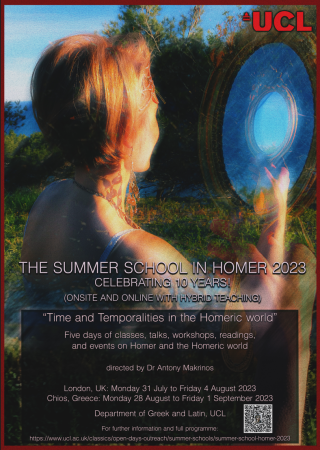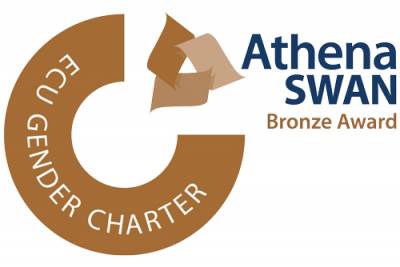
Programme for classes of the Summer School in Homer 2024 (TBC)
All information below is subject to change.
- Beginners Greek*
This course will be offered in two separate classes; one face-to-face and one online. Please stipulate when booking which mode you wish to join.
Book: "A Reading Course in Homeric Greek, Book 1 - by Raymond V. Schoder, S. J and Vincent C. Horrigan, S.J. - revised, with additional materials by Leslie Collins Edwards".
Pages 1-45, 52-54, 59-62, 66-68, 76-82 and 103-107 (i.e. Lessons 1-17, 20, 22, 24, 27-28, 32-33)
These pages cover:
- the alphabet and punctuation
- 1st, 2nd and 3rd declensions
- Present and Imperfect Active and Middle/Passive
- Present Imperative, Infinitive, Participles Active and Middle/Passive
- Intensive and Demonstrative Pronouns and Adjectives
- 1st and 2nd personal pronouns
- Intermediate Greek*
Book: A reading course in Homeric Greek, Book 1, 3rd edition (revised), by Raymond V. Schoder, S. J. and Vincent C. Horrigan, S.J.
Lessons: 18-19, 21, 23, 25-26, 29-31, 34-45, 49-50, 57 (i.e. pages: 46-51, 55-58, 63-65, 69-75, 83-102, 108-148, 158-164, 183-185)
These lessons cover:
- The Present Subjunctive and Optative, Active/Middle
- The Future System
- Participles
- First, Second and Third Aorist: Indicative, Subjunctive, Optative, Imperative, Infinitive, and Participle Active/Middle
- Perfect and Pluperfect Indicative Active
- Relative Pronoun and Relative clauses
- Interrogative and Indefinite pronouns/adjectives
- 3rd personal pronoun
- Comparison of Adjectives and Adverbs
- Advanced Greek*
This course will be offered in two separate classes; one face-to-face and one online. Please stipulate when booking which mode you wish to join.
Syllabus TBC
Based on previous experience, the advanced group should be able to get through nearly just over 600 lines. Around 120 lines a day is about right for reading, translation and discussion.
- Comparative Literature and Homer†
In this module, we shall travel backwards and forwards in time and space, from ancient Mesopotamia to Homeric Greece, to Imperial Rome, and to 19th century Vienna, with Homer’s Iliad and Odyssey as our central focus and guide. What is the relationship, the continuities and contrasts, between the 18th century BC Akkadian epic of Gilgamesh and the 8th century BC Greek epics of Homer? Can we see Gilgamesh and Homer in Virgil’s 1st century BC Roman epic The Aeneid? And, how does Sigmund Freud draw on these four epics in modernity, as he embarks on his own odyssey into the unconscious mind we all possess, and develops his theory of psychoanalysis and the Oedipus complex? Together we will explore these broad questions by closely reading selected passages from these ancient and modern texts, examining the Homeric undertones and overtones present in classical and psychoanalytic literature, bearing the overarching question of epic legacy in mind.
This module is suitable for all and no prior knowledge of ancient languages or theory is required; we will move through these vast topics at our own pace, in a friendly, discursive, and explorative learning environment.
- Homer and Ancient Philosophy†
Is Homer a philosopher? What can he teach us about the world we live in? Why is the power of Homer’s poetry so irresistible? Why were ancient philosophers so interested in Homeric poetry and its influence on the Greek world?
This course seeks to find an answer to these and other questions by investigating the relationship between Homer and ancient philosophy. We will approach the issue from two different perspectives. First, we will examine selected passages of Homer that are of philosophical significance, in particular on issues such as ethics, human knowledge, the relationship between gods and mortals, and conceptions of the soul and the afterlife. Then, we will focus on the reception, analysis and even appropriation of Homeric poetry on the part of ancient philosophers, ranging from early Greek to Hellenistic philosophy.
The course is in translation and open to anyone interested in Homeric poetry and ancient philosophy. No prior knowledge of ancient philosophy is required. Returning students who already attended the course in the past years will find new and exciting opportunities to enquire into the interactions between Homer and philosophy.
- Homer from Translation - Reception of Homer†
Themes: the gods and goddesses, women, heroism, aristeia, kleos, the Homeric question, Penelope, Helen, and Achilles and Hector. There will also be classes on reception of Homer in Renaissance and in all the above themes in other modes of representation such as novelisations, cinema, modern poetry etc.
- Modern novels and Homer
An exploration into Homeric patterns and allegorisations that feature in a series of diverse and thematically differing novelisations, discussing what the Homeric subtext can reveals about the narrative intentions of the author. Close readings of the original Homeric text, with translation, will be considered alongside the relevant novelisation, and investigated through the lenses of class, the position of women, queer theory and Epic status.
- Gender and Feminist Reception in Homer
Was Homer a misogynist? What was Penelope up to? Is Circe a wicked seductress or a benevolent confidante? How does Homer’s representation of women influence the dynamics of gender in the modern world? These are just some of the questions we will be asking in this introductory course to the topics of gender and feminism in Homer. In this course, we will read the epics closely, paying special attention to women, femininity, violence, and power. There are so many important and complex women in Homer, and this course offers an opportunity to delve deeper into their vivid characters. In addition to reading the epics, we will study a wide range of contemporary feminist theories, and investigate the influences and possibilities of feminist analysis in Homeric studies. Neither knowledge of Greek nor of feminist theory is required for this course. You will come away from this course with the skills and experience to read Homer’s women with depth and dissidence.
- The Victorian Homer
Could 13-year-old Elizabeth Moulton-Barrett reach her ambition of becoming the female Homer? Was Homer one great man? Could English be made to squeeze into the same beautiful hexameters as Homer’s Greek? This course will involve close readings of excerpts from both Homer and Victorian poetry, novels, and essays to explore four key themes: Victorian experiments in translating Homer and writing in Homeric metre; female writers’ study of and inspiration from Homer; C19 debates over the Homeric Question; and Victorian aesthetes’ disillusionment with Homer’s “clear-cut and departmental gods”. Victorian literature readings will include Elizabeth Barrett Browning, Matthew Arnold, Arthur Hugh Clough, Gerald Manley Hopkins, Algernon Charles Swinburne, George Eliot, Eliza Lynn Litton, Oscar Wilde, Walter Pater, and Jane Harrison.
language course / † literature course / ⁂ practical course
Programme, Cost and Application form
- The provisional programmes for the Summer School in Homer 2024 will soon be available. Please note: the programmes are still subject to change.
- The cost of each Summer School is £160. Please note that for cancellations after 1 June 2024, there will be a cancellation fee of £50.
The Summer School in Homer caters for school and university students, and for anyone else who wishes to learn Homeric Greek, or to revive their knowledge of it. Potential participants will include: students with no prior knowledge of the language; pre-GCSE/GCSE and A-Level students; university students; mature applicants who wish to expand their knowledge of the Homeric epics. Our principal concern is to provide a thorough programme of language learning in a lively university environment.
Enquiries: please email the Summer School.
A completed application form should be returned no later than Monday 22th July 2024, to Dr Antony Makrinos, Director of the Summer School in Homer, homersummerschool@ucl.ac.uk.
- Watch an interview with Dr Antony Makrinos on the Summer School in Homer.
Useful information
- Regulatory Framework
The UCL regulatory framework for life learning applies to this Summer School.
 Close
Close



